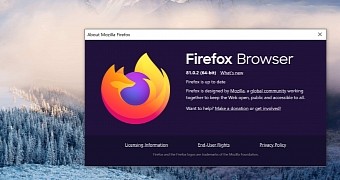Mozilla has released a new minor update for Firefox browser on all desktop platforms to correct a small bug found in the way Twitter.com is handled.
Firefox 81.0.2 is a minor revision to version 81, so it’s not supposed to introduce new features but further refine the experience with the browser on the desktop.
According to the official release notes, Firefox 81.0.2 “fixes an incompatibility with Twitter.com manifesting itself with the intermittent display of a network protocol violation error page.”
On the other hand, the good news is that Firefox 81 is thus getting more reliable, so if you’re using Mozilla’s browser, browsing the web should now be a more polished experience.
One of the biggest changes in this major Firefox release was the addition of the Alpenglow theme, which joins the dark and light skins on all supported desktop platforms. Furthermore, Mozilla implemented support for multimedia keyboard controls in the browser, essentially allowing users to pause and play audio and video in the app right from the keyboard or a headset.
But in addition to all the new features, Firefox 81 also included several accessibility refinements for native HTML5 audio and video controls, as it follows:
- Audio/video controls remain accessible to screen readers even when they are temporarily hidden visually.
- Audio/video elapsed and total time are now accessible to screen readers where they weren't previously.
- Various unlabelled controls are now labelled making them identifiable to screen readers.
- Screen readers no longer intrusively report progress information unless the user requests it.
As far as users expecting new features are concerned, worth knowing is that Mozilla has accelerated its release cycle, so new major browser updates are now shipped every 4 weeks, as compared to six weeks as it happened before.
This means that minor revisions like the one we told you about today also land at a faster pace too.
Mozilla changed its approach in this regard earlier this year after previously announcing the migration to the four-week release schedule in the fall of 2019.
“Shorter release cycles provide greater flexibility to support product planning and priority changes due to business or market requirements. With four-week cycles, we can be more agile and ship features faster, while applying the same rigor and due diligence needed for a high-quality and stable release. Also, we put new features and implementation of new Web APIs into the hands of developers more quickly. (This is what we’ve been doing recently with CSS spec implementations and updates, for instance.)” Mozilla said.
Because the likelihood of bugs in stable builds remains the same, Mozilla continues to push Firefox updates to users out there using a staged rollout, which means that not everybody sees a new update on day one. This allows the company to collect early feedback on a specific update and then develop a fix should it be needed before a potential bug hits more devices.
“Going forward, we will move to more frequent Beta builds, similar to what we have today in Firefox Nightly. Staged rollouts of features will be a continued best practice. This approach helps minimize unexpected (quality, stability or performance) disruptions to our release end-users. For instance, if a feature is deemed high-risk, we will plan for slow rollout to end-users and turn the feature off dynamically if needed,” the company explained.
Mozilla Firefox is currently the world’s third most popular browser on the desktop after Google Chrome and the new Chromium-based Microsoft Edge. Firefox, however, continues to be considered the main alternative to Chromium browsers regardless of the platform.

 14 DAY TRIAL //
14 DAY TRIAL //